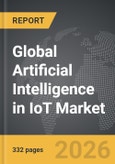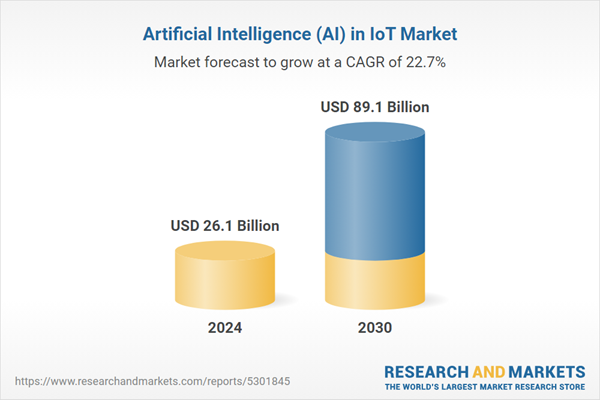Global Artificial Intelligence (AI) in IoT Market - Key Trends and Drivers Summarized
How Is AI Transforming Data Processing and Decision-Making in IoT?
Artificial Intelligence (AI) is revolutionizing the Internet of Things (IoT) by enabling faster, smarter data processing and real-time decision-making at unprecedented scales. Traditionally, IoT devices would collect data and transmit it to centralized servers for analysis, often causing delays in processing and response. Now, with AI embedded at the edge, IoT devices can process data locally, making instantaneous decisions without needing to rely on cloud connectivity. Edge AI allows connected devices to detect patterns, identify anomalies, and take corrective actions in real time, essential for time-sensitive applications like autonomous vehicles, industrial machinery, and smart medical devices. For example, in smart manufacturing, AI-powered IoT sensors monitor equipment for unusual vibrations or temperature spikes, triggering alerts or adjustments to prevent breakdowns and reduce downtime. AI's role in analyzing data directly within IoT systems streamlines operations and improves reliability, reducing latency and bandwidth use while empowering devices to function autonomously.Can AI Enhance Security and Predictive Maintenance in IoT Ecosystems?
AI is proving indispensable for enhancing the security and longevity of IoT networks by enabling predictive maintenance and bolstering cybersecurity measures. With the vast number of connected devices, IoT networks are particularly vulnerable to cyber threats, as each device potentially introduces new security risks. AI-driven cybersecurity solutions continuously monitor network traffic and device behavior, identifying anomalies that may indicate potential attacks, such as unauthorized access or malware, and responding proactively to mitigate threats. Companies like Darktrace and Cisco use AI to provide real-time threat detection and response, safeguarding IoT networks against ever-evolving cyber risks. Additionally, AI-powered predictive maintenance in IoT systems analyzes data from connected devices to forecast when equipment might fail, allowing for timely repairs before issues disrupt operations. In sectors like manufacturing, transportation, and energy, predictive maintenance minimizes costly downtime and extends equipment lifespan by identifying maintenance needs early. By enhancing security and enabling proactive maintenance, AI strengthens IoT infrastructure, ensuring operational continuity and protection against potential threats.How Is AI Driving Efficiency in Smart Cities and Industrial IoT?
AI is a critical component in maximizing the efficiency of IoT-driven smart cities and industrial applications. In smart cities, AI enables intelligent systems that manage traffic, energy consumption, waste management, and public safety more effectively. For instance, AI in IoT-powered traffic management systems can analyze data from sensors, cameras, and GPS to predict congestion patterns and optimize traffic flow in real time, reducing commute times and minimizing emissions. Similarly, AI-driven energy management solutions in smart grids can predict energy demand based on usage patterns, adjust power distribution, and incorporate renewable energy sources, creating a more sustainable urban infrastructure. In industrial IoT, AI-powered solutions enable real-time monitoring and optimization of factory operations, supply chains, and logistics. Companies such as Siemens and GE employ AI in industrial IoT systems to enhance productivity by analyzing sensor data from machinery, predicting maintenance needs, and optimizing workflows. Through these applications, AI maximizes IoT's potential to create smarter, more efficient environments in both urban and industrial contexts.What Factors Are Driving the Growth of AI in the IoT Market?
The growth in the AI in IoT market is driven by several key factors, including advancements in AI technology, increased adoption of IoT devices, and rising demand for automation and predictive capabilities. As the number of connected devices expands across industries, there is an urgent need for advanced AI-driven analytics that can process and interpret massive datasets in real time, enabling devices to make autonomous decisions and improve operational efficiency. The rise of edge computing has been instrumental, allowing AI algorithms to run directly on IoT devices, reducing dependency on cloud processing and enabling faster responses. Increasing cybersecurity concerns are also fueling AI adoption in IoT, as AI's ability to detect and mitigate threats proactively makes it an essential tool for securing connected networks. Furthermore, the demand for predictive maintenance and operational optimization is growing as industries seek to reduce costs and improve uptime; AI-driven IoT solutions are critical to achieving these goals, especially in sectors like manufacturing, healthcare, and transportation. Strategic partnerships between tech companies and IoT providers are accelerating the development of AI-IoT applications, driving innovation and expanding market reach. Together, these factors are positioning AI as an indispensable component of IoT, ensuring scalability, efficiency, and security across increasingly connected environments.Report Scope
The report analyzes the Artificial Intelligence (AI) in IoT market, presented in terms of market value (US$ Thousand). The analysis covers the key segments and geographic regions outlined below.- Segments: Component (Platforms, Software Solutions, Services); Technology (Machine Learning & Deep Learning, Natural Language Processing).
- Geographic Regions/Countries:World; United States; Canada; Japan; China; Europe (France; Germany; Italy; United Kingdom; and Rest of Europe); Asia-Pacific; Rest of World.
Key Insights:
- Market Growth: Understand the significant growth trajectory of the Platforms Component segment, which is expected to reach US$32.1 Billion by 2030 with a CAGR of a 20.6%. The Software Solutions Component segment is also set to grow at 25.1% CAGR over the analysis period.
- Regional Analysis: Gain insights into the U.S. market, valued at $7.6 Billion in 2024, and China, forecasted to grow at an impressive 22.1% CAGR to reach $13.8 Billion by 2030. Discover growth trends in other key regions, including Japan, Canada, Germany, and the Asia-Pacific.
Why You Should Buy This Report:
- Detailed Market Analysis: Access a thorough analysis of the Global Artificial Intelligence (AI) in IoT Market, covering all major geographic regions and market segments.
- Competitive Insights: Get an overview of the competitive landscape, including the market presence of major players across different geographies.
- Future Trends and Drivers: Understand the key trends and drivers shaping the future of the Global Artificial Intelligence (AI) in IoT Market.
- Actionable Insights: Benefit from actionable insights that can help you identify new revenue opportunities and make strategic business decisions.
Key Questions Answered:
- How is the Global Artificial Intelligence (AI) in IoT Market expected to evolve by 2030?
- What are the main drivers and restraints affecting the market?
- Which market segments will grow the most over the forecast period?
- How will market shares for different regions and segments change by 2030?
- Who are the leading players in the market, and what are their prospects?
Report Features:
- Comprehensive Market Data: Independent analysis of annual sales and market forecasts in US$ Million from 2024 to 2030.
- In-Depth Regional Analysis: Detailed insights into key markets, including the U.S., China, Japan, Canada, Europe, Asia-Pacific, Latin America, Middle East, and Africa.
- Company Profiles: Coverage of players such as Anagog, Arundo, Autoplant Systems India Pvt. Ltd., AWS, C3 IoT and more.
- Complimentary Updates: Receive free report updates for one year to keep you informed of the latest market developments.
Some of the 234 companies featured in this Artificial Intelligence (AI) in IoT market report include:
- Anagog
- Arundo
- Autoplant Systems India Pvt. Ltd.
- AWS
- C3 IoT
- GE
- Hitachi
- IBM
- Imagimob
- Kairos
- Microsoft
- Oracle
- PTC
- Salesforce
- SAP
- SAS
- Softweb Solutions
- Thingstel
- Uptake
This edition integrates the latest global trade and economic shifts into comprehensive market analysis. Key updates include:
- Tariff and Trade Impact: Insights into global tariff negotiations across 180+ countries, with analysis of supply chain turbulence, sourcing disruptions, and geographic realignment. Special focus on 2025 as a pivotal year for trade tensions, including updated perspectives on the Trump-era tariffs.
- Adjusted Forecasts and Analytics: Revised global and regional market forecasts through 2030, incorporating tariff effects, economic uncertainty, and structural changes in globalization. Includes historical analysis from 2015 to 2023.
- Strategic Market Dynamics: Evaluation of revised market prospects, regional outlooks, and key economic indicators such as population and urbanization trends.
- Innovation & Technology Trends: Latest developments in product and process innovation, emerging technologies, and key industry drivers shaping the competitive landscape.
- Competitive Intelligence: Updated global market share estimates for 2025, competitive positioning of major players (Strong/Active/Niche/Trivial), and refined focus on leading global brands and core players.
- Expert Insight & Commentary: Strategic analysis from economists, trade experts, and domain specialists to contextualize market shifts and identify emerging opportunities.
Table of Contents
Companies Mentioned (Partial List)
A selection of companies mentioned in this report includes, but is not limited to:
- Anagog
- Arundo
- Autoplant Systems India Pvt. Ltd.
- AWS
- C3 IoT
- GE
- Hitachi
- IBM
- Imagimob
- Kairos
- Microsoft
- Oracle
- PTC
- Salesforce
- SAP
- SAS
- Softweb Solutions
- Thingstel
- Uptake
Table Information
| Report Attribute | Details |
|---|---|
| No. of Pages | 332 |
| Published | January 2026 |
| Forecast Period | 2024 - 2030 |
| Estimated Market Value ( USD | $ 26.1 Billion |
| Forecasted Market Value ( USD | $ 89.1 Billion |
| Compound Annual Growth Rate | 22.7% |
| Regions Covered | Global |









